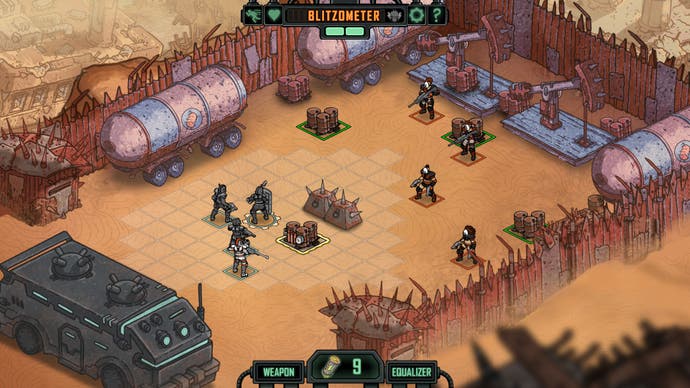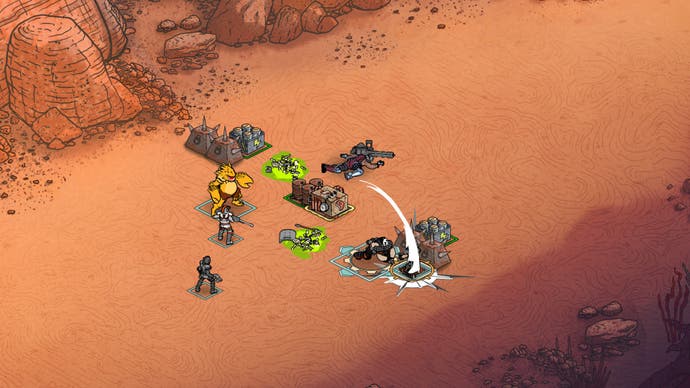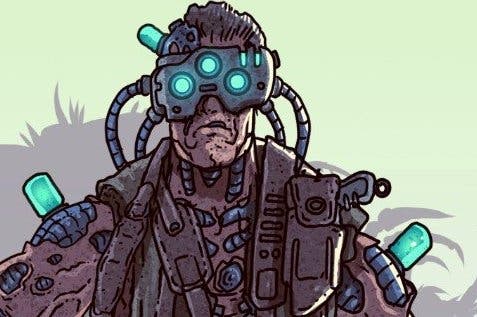Skyshine's Bedlam Review
Infuriating Road.
Permadeath can make all the difference. With the right game built around it this one simple not-really-a-word can transform a player's experience into something that feels consistently important. Screw up and you suffer the consequences, but if you make the right call, you'll be that much more satisfied in your victory. It's the reason that many of us fell in love with XCOM three years ago - but it's important to remember that it wasn't the only reason. You see, for permadeath to work, almost everything else needs to be designed around it and in Skyshine's Bedlam, that isn't always the case.
Which is a shame! Because at first glance, I think Bedlam has a lot going for it. Set in one of those post-apocalyptic worlds that video games like so much, you're tasked with crossing the nuclear wasteland in hopes of salvation. Reach Aztec City, they tell you, and you might survive. Alright, okay, this isn't an entirely new concept, but it does provide all of the necessary context for a world that contains cyborgs, mutants, cyborg mutants, and characters that didn't quite make it into the latest Mad Max. And anyway, regardless of all that, the means of transport is brill: a giant rolling fortress, known as a 'Dozer'.
Armed to the teeth (quite literally in the case of the unlockable mutant vessel), your journey begins easily enough. Presented with multiple routes, all leading towards the fabled Aztec City, you'll want to have a good nosy around each area you travel through. Exploration is rewarded with all sorts of treats: additional food and oil to keep your Dozer moving, and the soldiers you'll need to defend it. Because of this, I found it difficult to pass up on anything that popped up along the way, despite the possibility that it could involve an unnecessary fight. And there's a greater danger to consider, too. The longer you dawdle in Bedlam, the more difficult it becomes. Early encounters will pit you against three, maybe four enemies, but this number quickly spirals out of control as you spend more time on the road.

And there's perhaps another incentive to push your luck here. As well as the extra resources, these side events are where most of Bedlam's storytelling takes place, in the form of small Choose Your Own Adventure moments. Selecting the wrong option can trigger a fight you're not ready for, or see you lose food, oil, or passengers (easily the most expendable option, if I'm honest). It's an important part of the game and, to start with, I enjoyed the element of risk that was involved, but this is swiftly undermined by the fact that Bedlam is a game that's meant to be replayed. Either through failing and needing to restart a run, or by succeeding and trying again at a harder difficulty, you're encouraged to tackle the wasteland multiple times. And so, as you repeat these side objectives (many of which don't feature any random elements whatsoever), you'll find that you know exactly how they're going to play out. This, in turn, makes the whole thing feel a bit redundant, and you'll soon find yourself skipping through pages of very familiar text.
This conflict in design is perhaps at its most obvious in the game's turn-based combat. Here, with permadeath in the mix, the smallest problems can soon prove infuriating. Running on The Banner Saga Game Engine, it appears that Bedlam has inherited one of the few gripes I had with Stoic's mournful tale. In both games, combat sees both the player and their opponent alternate turns after performing just two actions. Even when hugely outnumbered, both sides will have exactly the same number of turns to work with, and this creates an interesting, arguably flawed dynamic in which a couple of powerful units can wade through a much larger force with ease. The Banner Saga had a couple of failsafes in place to counteract this, reverting to a more traditional ruleset once either side was down to just a single unit, as well as allowing the player to select their formation at the beginning of the battle, preventing weaker units from being killed before they could move to safety. Unfortunately, Bedlam decided not to inherit those bits as well. It's suffered as a result.
Fittingly for a game that's concerned with managing several resources as they steadily trickle away, it's these seemingly inconsequential problems that sap a lot of the fun here. With some units (particularly those belonging to the high damage/low health Deadeye class) being incredibly fragile, you can easily find yourself losing characters, and permanently, because of the seemingly random position in which they start a battle. When this happens, and especially when you've invested some real time and resources into that character, it's incredibly frustrating - and not in the way these games are meant to frustrate. There's a huge difference between having your treasured gunslinger die because of a mistake you've made and having them die because you felt the game cheated you.

The word 'random' can cause a lot of problems in a game like this, actually. I've played something like 10 hours of Bedlam and I'm still not sure exactly what standing behind cover achieves. I know that sometimes it leads to the enemy missing their shot, but I don't know how good those odds actually are. Is it ever worth taking the risk? I don't know. Likewise, your deadshot characters can occasionally land a headshot against enemy units, which usually leads to a one-shot kill. It's an incredibly useful ability and I have no idea how often to expect it. Is that something I can gamble on? I don't know that either. This type of second guessing doesn't suit a turn-based strategy game. The reason I love this genre is because I'm usually presented with all of the information I'll need and then I get to make what I think is the best decision. Sometimes that decision backfires and that's on me. But once again, that's the key difference, isn't it? I'm happy to make mistakes, but let them be my mistakes!
One final weapon in your arsenal is provided by the Dozer itself. It's a bit of a shame that you never get to see these giant war machines in action, as they look so impressive, but they can provide off screen assistance during combat. By collecting enough energy both on the world map and during the encounters themselves, you can activate additional attacks and buffs for your squad on the ground. These vary from missile strikes to teleportation to healing, and prove absolutely vital as the difficulty progresses. In the early game you might reserve these abilities for the moments in which you need to intervene and save an important soldier, but as you approach the final hour, you'll absolutely require them.
The energy you're spending here is the same resource that you'll need to upgrade the Dozer itself and to have any chance at making it through the late game, you'll need to be very frugal with how and where you use it. Although I appreciate the way in which this links your actions on the world map with the battles themselves, I never quite clicked with this side of the game. Whenever I did use these power ups, it felt a bit like cheating. Maybe this is a side effect of playing too many free-to-play games that would use a system like this to sell microtransactions? I don't know, but it felt off. Once you know when the final boss fight takes place, for example, it's entirely possible to stockpile enough energy to trivialise the entire battle.
Skyshine Games are already talking about their first major patch, and hopefully some of these problems will be addressed - along with some of the more significant bugs. As it stands right now, you can expect the game to crash at least once or twice during a run through the wastelands of Bedlam, and I've also run into a number of encounters in which the enemy simply refused to fight back.
I'd be surprised if these issues weren't eventually fixed, but even then, I'd struggle to recommend Skyshine's Bedlam. It does have some interesting ideas and it's a fantastic setting to play around in, but fundamentally, there's a mix of ideas here that just doesn't quite work. I like that it's a difficult game, but it needs to be a fair one as well.


